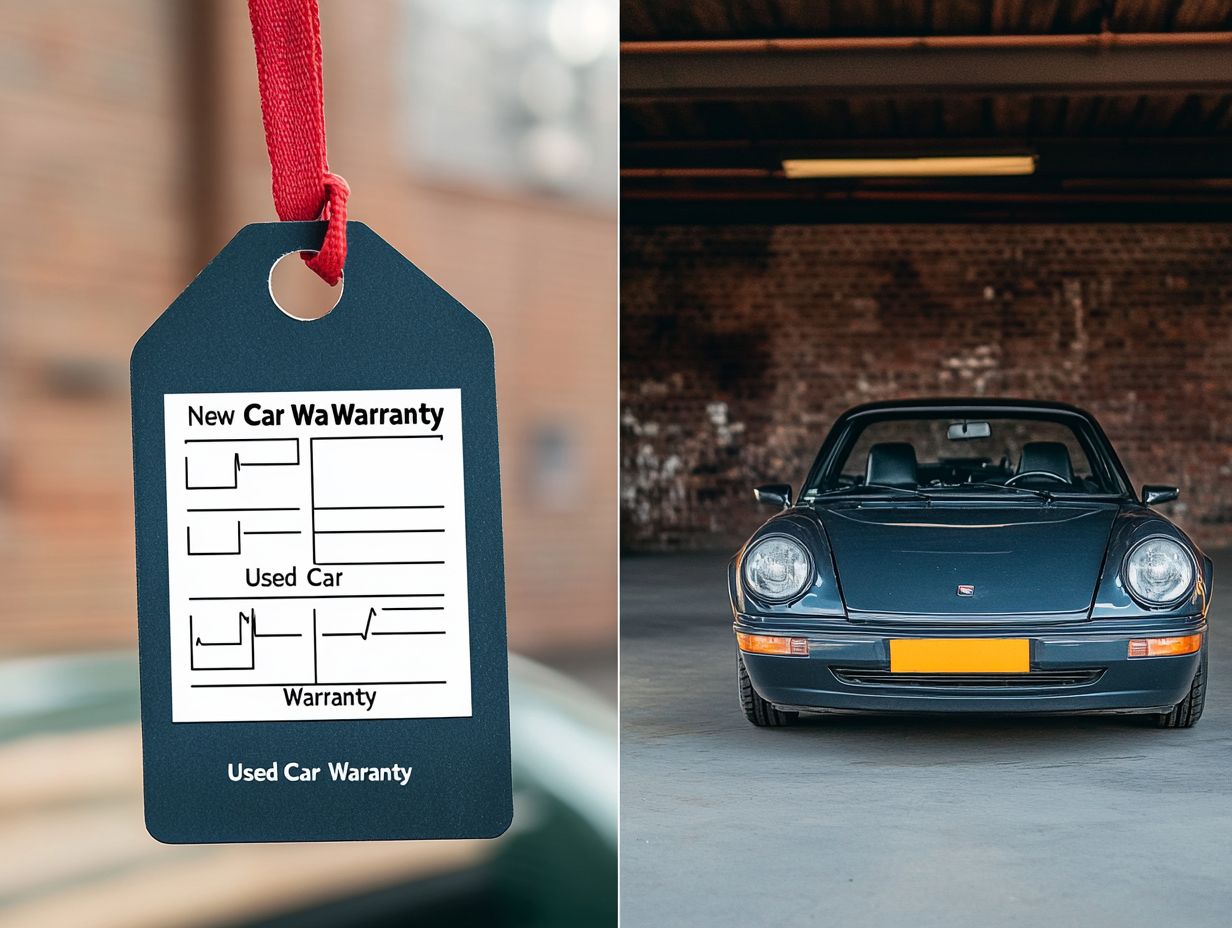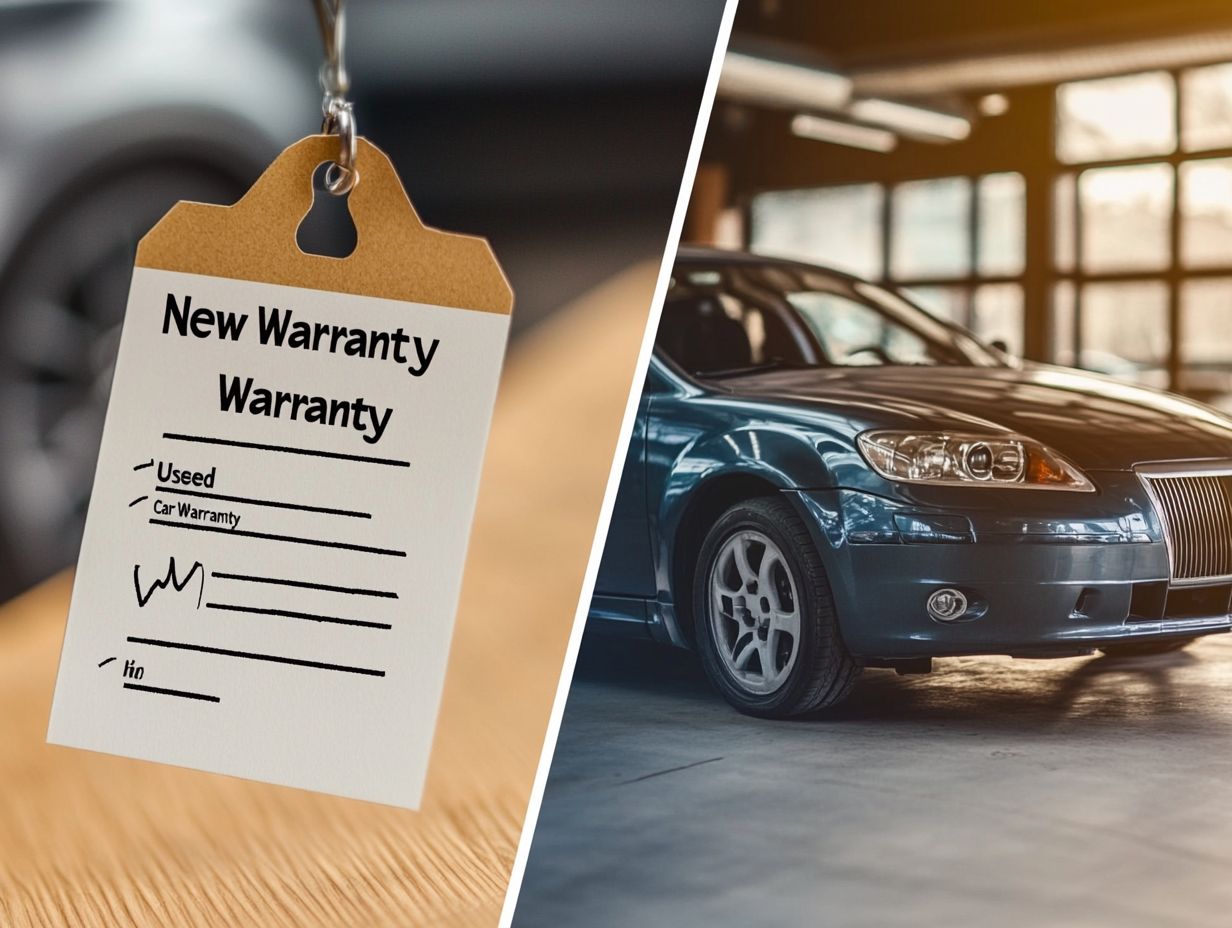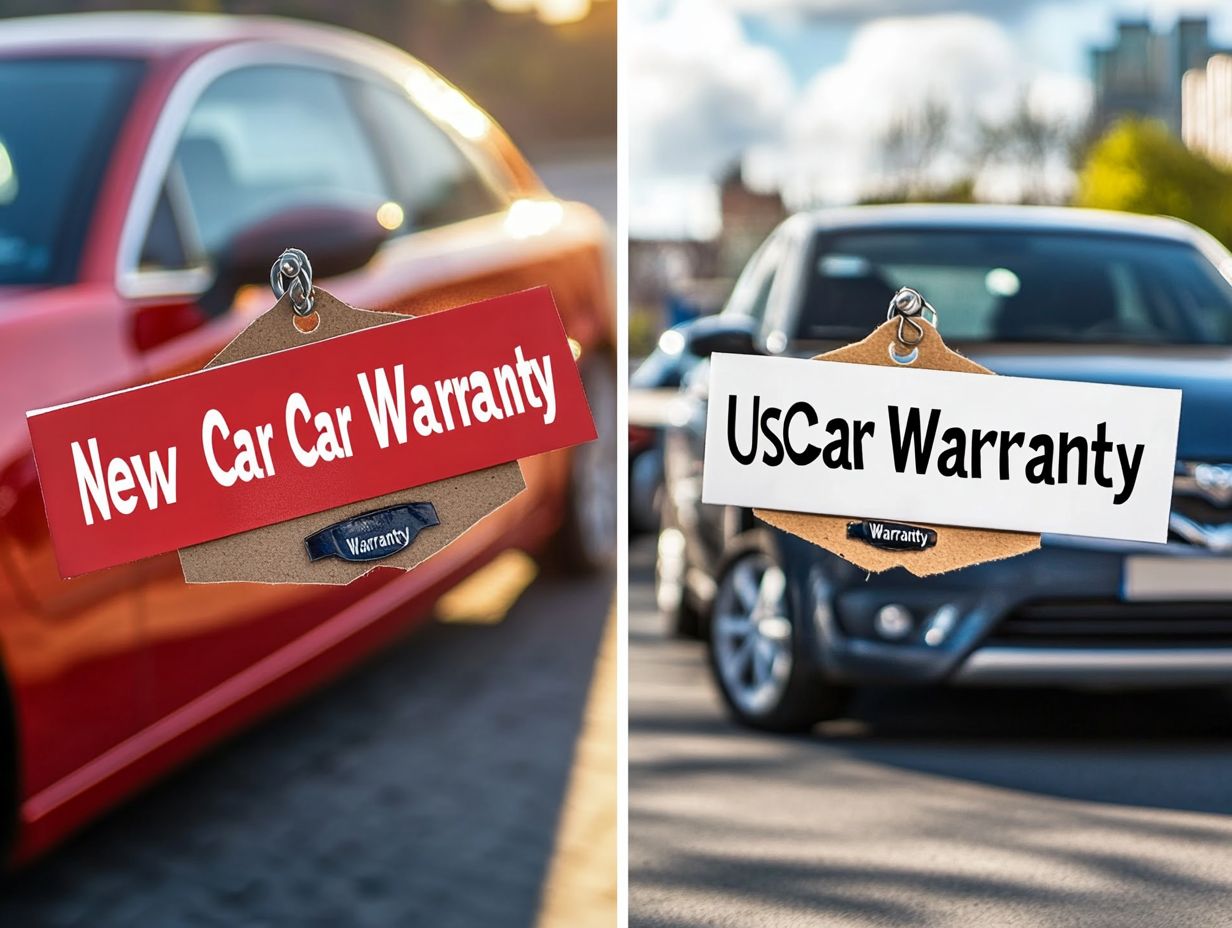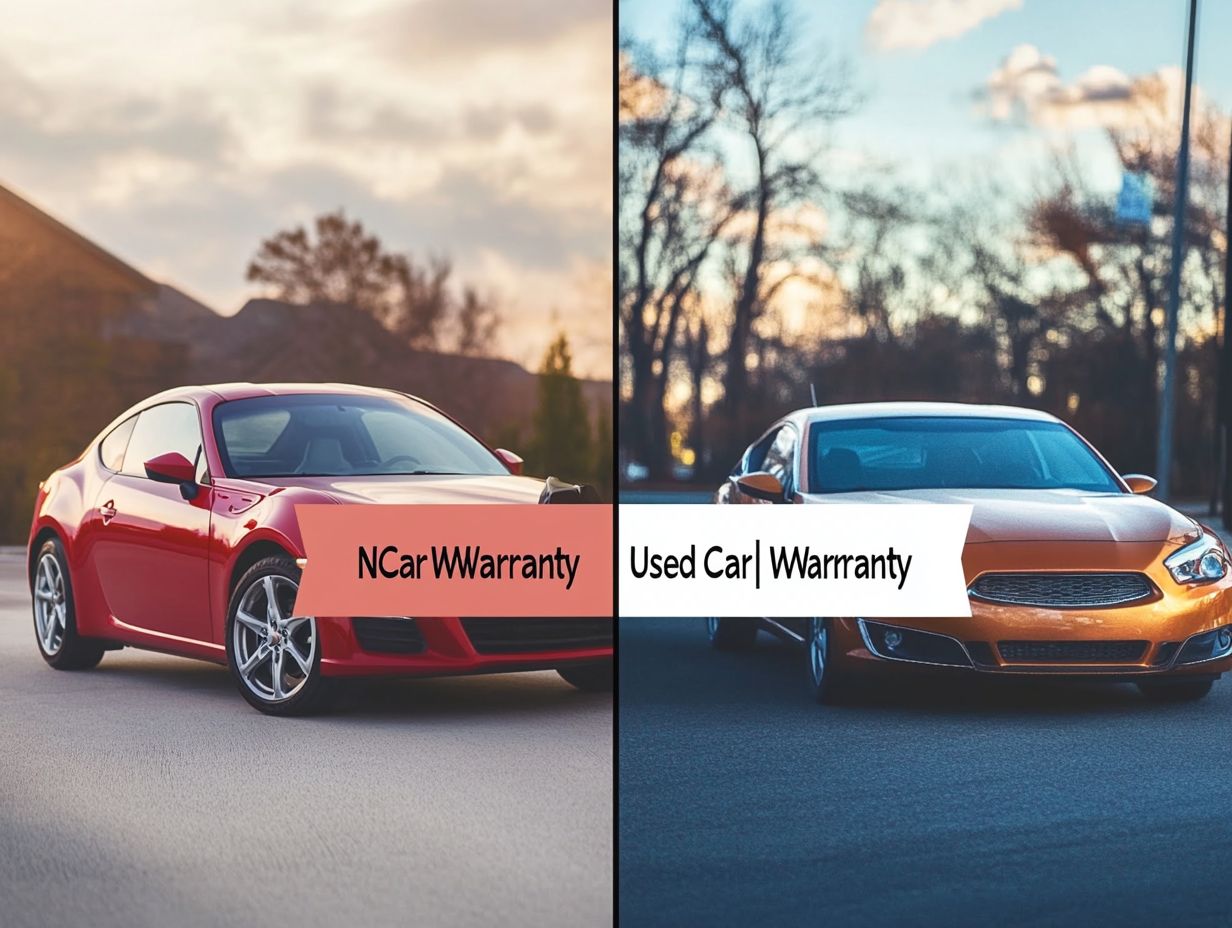The Difference Between New and Used Car Warranties
When you’re in the market for a car, understanding car warranties can truly be a game-changer.
Whether you re eyeing a brand-new model or a reliable used option, knowing what a car warranty covers and what it doesn t can save you significant time and money, along with the frustration that comes with unexpected surprises.
This article explores the types of car warranties, illuminating the benefits and limitations of both new and used options, while helping you determine which warranty aligns with your needs. Get ready to make smart choices for your next vehicle!
Contents
- Key Takeaways:
- Understanding Car Warranties
- New Car Warranties
- Used Car Warranties
- Comparing New and Used Car Warranties
- Cost and Coverage Differences
- Which is Right for You?
- Frequently Asked Questions
- What is the difference between a new and used car warranty?
- What type of coverage do new and used car warranties offer?
- How long do new and used car warranties last?
- Are there any differences in the cost of new and used car warranties?
- Can I transfer a new or used car warranty to a new owner?
- What are the benefits of having a new or used car warranty?
Key Takeaways:

- New car warranties offer comprehensive coverage and benefits but may have limitations and exclusions based on the manufacturer’s policies.
- Used car warranties provide varying levels of coverage, depending on the vehicle’s type and age. It is important to consider factors such as mileage and repair history before purchasing.
- When comparing new and used car warranties, consider both the cost and coverage differences to determine which option best fits your needs and budget.
Understanding Car Warranties
Understanding car warranties is essential for you as a vehicle owner. They offer important protection against unexpected car problems and expensive repairs. Gaining insight into extended warranties coverage that lasts beyond the standard warranty period and the various options available from warranty companies enables you to make informed decisions when purchasing used cars.
By grasping the differences between manufacturer warranties and extended warranties, you can enhance your vehicle’s reliability and gain peace of mind, leading to more strategic warranty claims and greater satisfaction.
What is a Car Warranty?
A car warranty is a contract you enter into, offered by either the manufacturer or third-party warranty companies, designed to cover specific repair costs related to vehicle performance issues.
These warranties can vary significantly in terms of coverage and duration, providing different protection levels depending on the provider. Manufacturer warranties typically cover defects in materials and workmanship for a defined period or mileage, giving you peace of mind by protecting you against unexpected repairs during the early years of ownership.
Third-party warranties fill gaps left by manufacturer options or offer extended coverage for older vehicles, often including perks like roadside assistance. Understanding the nuances of each type allows you to make informed decisions that protect your investment and enhance your driving experience.
Types of Car Warranties
There are several types of car warranties available, including extended warranties, inclusion warranties, and exclusion warranties. Each is designed to cater to the diverse needs of vehicle owners.
Understanding these options is essential, as they can significantly impact your repair expenses and overall peace of mind. Extended warranties often provide coverage that goes beyond the standard manufacturer s guarantee, protecting you from unexpected repair costs as your vehicle ages.
Inclusion warranties cover specific components. While they can be budget-friendly, they may exclude critical parts, leading to higher out-of-pocket expenses later on. Exclusion warranties clearly outline what is not covered, helping you understand potential repair costs, but may also catch you off guard with unexpected financial burdens if repairs arise outside the specified components.
By fully grasping the implications of these warranty types, you can make informed decisions that align with your unique needs.
New Car Warranties
New car warranties, commonly known as factory warranties, are offered by manufacturers to ensure that your vehicle meets safety standards and operates reliably during the crucial early years of ownership.
Coverage and Benefits

The coverage and benefits of new car warranties are designed to give you peace of mind. They take care of a range of repair bills and maintenance costs related to your vehicle’s performance.
These warranties typically offer full coverage for essential components like the engine, transmission, and electrical systems. This ensures that unexpected breakdowns won t create significant financial burdens. While many agreements cover various parts, there may be exclusions for wear-and-tear items, like brake pads or tires.
By investing in warranty coverage, you can greatly reduce potential extra costs related to repairs. This allows you to budget more effectively and enjoy your new vehicle without the worry of costly repairs looming overhead.
Limitations and Exclusions
While new car warranties provide extensive coverage, they also come with specific limitations and exclusions. Understanding these terms is vital to avoid unexpected repair costs.
Misunderstanding these terms can lead to frustrating situations, especially when you face high-cost repairs that seem covered at first glance. Items like brake pads, tires, and batteries typically aren’t covered. Many discover too late that damage from accidents or poor maintenance is also not included.
It’s crucial to thoroughly read and understand your warranty documentation. This way, you can grasp what is and isn t included, ensuring your investment is a well-informed one.
Used Car Warranties
Used car warranties offer essential protection when purchasing pre-owned vehicles. These warranties come with extended options and comprehensive support from various reputable warranty companies, designed to ensure your vehicle’s reliability and your peace of mind.
Types of Used Car Warranties
You ll encounter several types of used car warranties, including extended warranties and various coverage options from warranty companies, each offering different levels of protection.
These warranties can range from comprehensive bumper-to-bumper plans, covering most vehicle components, to focused options that address essential systems like the powertrain the parts that make your car move, like the engine and transmission. The cost of these warranties varies greatly, influenced by your vehicle’s age and make, as well as the specific coverage you choose.
When selecting the right option, it s important to assess your driving habits, your vehicle’s reliability, and your budget. Take the time to research consumer reviews and shop around. This helps you find the best warranty that meets your needs and ensures worry-free driving.
Factors to Consider Before Purchasing
Before opting for a used car warranty, consider key factors: the cost of the warranty, the provider’s reputation, and the findings from a thorough vehicle inspection.
It s also important to look into the warranty s track record by researching consumer complaints and reviews. This information helps you quickly gauge the reliability and responsiveness of the warranty provider. Understanding potential repair costs associated with specific vehicle issues will also help you determine if the warranty provides sufficient coverage.
By thoroughly reviewing the terms of coverage including what is included and excluded you can make informed decisions that align with your needs. This ultimately enhances your overall satisfaction with your investment in a used car warranty.
Comparing New and Used Car Warranties

When comparing new car warranties to used car warranties, it’s important to assess the cost differences and explore the understanding new car warranties that offer a range of coverage options available.
This evaluation enables you to make an informed purchasing decision that best suits your needs. Act now to protect your investment!
Cost and Coverage Differences
The differences in cost and coverage between new car warranties and used car warranties can greatly influence your decisions, particularly regarding anticipated repair expenses.
New car warranties often boast extensive coverage, offering free repairs for several years or up to a specific mileage limit. Used car warranties, however, typically provide more limited protection. You might find yourself facing higher out-of-pocket costs extra costs you have to pay yourself if any issues arise after your purchase.
Generally, new warranties come with a heftier price tag, often rolled into the vehicle’s total cost. Used options, while typically more affordable upfront, require a careful check of what exactly is covered.
You must assess these financial factors now to avoid potential costs later, considering your long-term plans and the likelihood of encountering issues down the road.
Which is Right for You?
Determining whether a new car warranty or a used car warranty is the right choice for you hinges on your individual consumer needs and the specific benefits each option offers.
Understanding these distinctions can profoundly influence your long-term satisfaction and financial well-being. For example, think about the age of the vehicle newer models typically come with strong manufacturer warranties that cover a wide array of repairs, including both parts and labor. On the other hand, used cars may necessitate more extensive coverage based on their history and potential repair costs, which could become a financial strain over time.
Explore different coverage options to find the best fit for you! Some plans may even include perks like roadside assistance or rental car reimbursement. These features can be invaluable for anyone seeking peace of mind with their investment.
Frequently Asked Questions
What is the difference between a new and used car warranty?
A new car warranty is provided by the manufacturer and covers the cost of repairs or replacements for certain parts and components for a specific period or mileage. A used car warranty, on the other hand, is often provided by the dealership or a third party and may have more limited coverage options.
What type of coverage do new and used car warranties offer?

New car warranties usually cover a wider range of components compared to used car warranties. They typically cover major systems such as engine, transmission, and electrical, while used car warranties may cover only certain parts.
How long do new and used car warranties last?
New car warranties typically last for a set number of years or miles, whichever comes first. Used car warranties may have different time frames, so check each one carefully.
Are there any differences in the cost of new and used car warranties?
New car warranties are usually included in the vehicle’s cost and are non-negotiable. Used car warranties may be offered as an add-on purchase, and the cost can vary depending on the coverage, age, and mileage of the vehicle.
Can I transfer a new or used car warranty to a new owner?
New car warranties are typically non-transferable and only remain with the original owner. Used car warranties may be transferable, depending on the specific warranty and the provider’s terms and conditions.
What are the benefits of having a new or used car warranty?
New and used car warranties can provide peace of mind by covering the cost of unexpected repairs or replacements. They can also help save money in the long run, as unexpected repairs can be quite expensive without warranty coverage.



